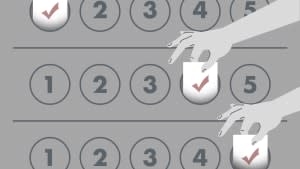Ranked-choice voting will make America's democracy problems worse

On June 22, New York City will conduct its Democratic mayoral primary using ranked-choice voting (RCV). Though the electoral system has been adopted in other places — the cities of San Francisco, Oakland, and Minneapolis/St. Paul; the state of Maine — this will be its biggest test so far in the United States. Regardless of how Democrats in the country's largest city respond to the experience, Americans should be wary of expanding on the RCV experiment. Advocates argue it will discourage negative campaigning and expand choice for voters, but in reality it will make the country's burgeoning disputes about democracy far worse.
RCV is an electoral system only someone who likes to geek out to the logic games on the LSAT could love. Voters are asked to rank candidates for office in order of preference: first choice, second choice, third choice, and so on. (The number of ranking slots varies by jurisdiction, as of course does the total number of candidates competing in a given race.) Then the tabulations begin. Instead of simply adding up the number of votes each candidate received and pronouncing the one with the most votes to be the winner, RCV counting begins by adding up all the first-choice votes. Then, if none of the candidates has received a majority, the candidate who received the least first-choice votes gets eliminated and those who gave their first-choice votes to that lowest-scoring candidate have their votes reallocated to their second choice. Then the process gets repeated until one of the candidates ends up with a majority.
As one might imagine, this can get extremely complicated, with election tabulators working through ballots multiple times, or relying heavily on complex computer software to do the work for them. The system is also supremely complicated for voters, who can face dauntingly complex strategic decisions in ranking their choices. (This Vox explainer on RCV, focusing on the New York City primary, helpfully lays out some of this complexity.)
The U.S. is a country rife with distrust of institutions and experts, and plagued by growing skepticism about the reliability of elections. The intricacy of RCV tabulations, with officials taking days (or longer) to calculate results behind closed doors and the outcome possibly differing significantly from the stated first-choice preferences of voters, is guaranteed to intensify our disputes around how to fairly and democratically allocate representative offices. Elections and their outcomes need to become simpler and more transparent, not more opaque. RCV is the last thing America needs.
You may also like
7 scathingly funny cartoons about Democrats' Joe Manchin problem
Bernie Sanders wants to know if cannabis reporter is 'stoned' right now
